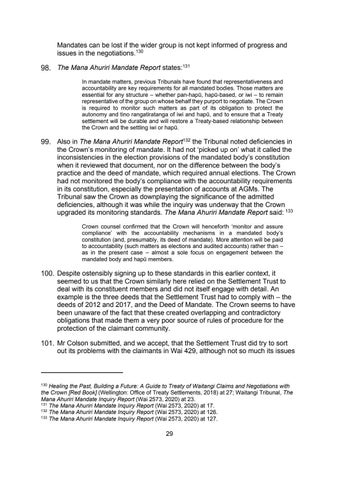Mandates can be lost if the wider group is not kept informed of progress and issues in the negotiations.130
98. The Mana Ahuriri Mandate Report states:131 In mandate matters, previous Tribunals have found that representativeness and accountability are key requirements for all mandated bodies. Those matters are essential for any structure – whether pan-hapū, hapū-based, or iwi – to remain representative of the group on whose behalf they purport to negotiate. The Crown is required to monitor such matters as part of its obligation to protect the autonomy and tino rangatiratanga of iwi and hapū, and to ensure that a Treaty settlement will be durable and will restore a Treaty-based relationship between the Crown and the settling iwi or hapū.
99. Also in The Mana Ahuriri Mandate Report132 the Tribunal noted deficiencies in the Crown’s monitoring of mandate. It had not ‘picked up on’ what it called the inconsistencies in the election provisions of the mandated body’s constitution when it reviewed that document, nor on the difference between the body’s practice and the deed of mandate, which required annual elections. The Crown had not monitored the body’s compliance with the accountability requirements in its constitution, especially the presentation of accounts at AGMs. The Tribunal saw the Crown as downplaying the significance of the admitted deficiencies, although it was while the inquiry was underway that the Crown upgraded its monitoring standards. The Mana Ahuriri Mandate Report said: 133 Crown counsel confirmed that the Crown will henceforth ‘monitor and assure compliance’ with the accountability mechanisms in a mandated body’s constitution (and, presumably, its deed of mandate). More attention will be paid to accountability (such matters as elections and audited accounts) rather than – as in the present case – almost a sole focus on engagement between the mandated body and hapū members.
100. Despite ostensibly signing up to these standards in this earlier context, it seemed to us that the Crown similarly here relied on the Settlement Trust to deal with its constituent members and did not itself engage with detail. An example is the three deeds that the Settlement Trust had to comply with – the deeds of 2012 and 2017, and the Deed of Mandate. The Crown seems to have been unaware of the fact that these created overlapping and contradictory obligations that made them a very poor source of rules of procedure for the protection of the claimant community. 101. Mr Colson submitted, and we accept, that the Settlement Trust did try to sort out its problems with the claimants in Wai 429, although not so much its issues
130
Healing the Past, Building a Future: A Guide to Treaty of Waitangi Claims and Negotiations with the Crown [Red Book] (Wellington: Office of Treaty Settlements, 2018) at 27; Waitangi Tribunal, The Mana Ahuriri Mandate Inquiry Report (Wai 2573, 2020) at 23. 131 The Mana Ahuriri Mandate Inquiry Report (Wai 2573, 2020) at 17. 132 The Mana Ahuriri Mandate Inquiry Report (Wai 2573, 2020) at 126. 133 The Mana Ahuriri Mandate Inquiry Report (Wai 2573, 2020) at 127.
29



